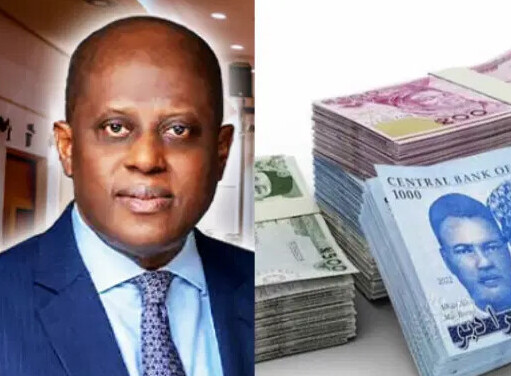The Central Bank of Nigeria (CBN) has projected a 4.1% economic growth for 2025, along with a decline in inflation and increased foreign exchange inflows. In a keynote address at the Nigeria Economic Summit Group’s 2025 Macroeconomic Outlook launch, CBN Governor Mr. Olayemi Cardoso highlighted that reforms in the foreign exchange market in 2025 are expected to attract $6 billion in foreign capital. The Federal Government supports a forecasted inflation rate decline to 15% this year, claiming it is grounded in data.
Additionally, the Nigeria Economic Summit Group (NESG) has recommended strategies for achieving economic stability and a targeted 5.5% growth in 2025. The World Bank has urged the government to expand its social intervention programs to help alleviate the burden of economic reforms on the impoverished and vulnerable populations.
During a recent event, CBN Governor Mr. Olayemi Cardoso highlighted a positive economic outlook for 2025, projecting GDP growth to rise to 4.17% from 3.36% in 2024. This growth is attributed to ongoing government reforms, stable crude oil prices, improvements in domestic oil production, and increased refining capacity, particularly from the Dangote refinery and revitalized facilities in Port Harcourt and Warri. He noted that a stable exchange rate would also support this upward trend.
Cardoso anticipates a decline in domestic inflation as the effects of economic reforms take hold. He emphasized the importance of collaboration between monetary and fiscal authorities, alongside private sector engagement, to achieve economic goals. The CBN projects a sustained current account surplus in 2025, driven by strong export performance and steady diaspora remittances, while external reserves are expected to rise, supported by increased crude oil production and reduced reliance on imported fuel.
Furthermore, the Governor expressed optimism regarding foreign exchange inflows, pointing out that reforms have already resulted in over $6 billion in foreign capital and external reserves surpassing $40 billion, reflecting growing investor confidence in Nigeria’s economy.
The CBN emphasizes not only the increase in reserves, but also their quality, as it seeks to implement market-oriented policies that foster a competitive business environment throughout 2025. This shift has significant implications for businesses in Nigeria, necessitating adaptation to the changing economic landscape.
CBN Governor Mr. Olayemi Cardoso outlined the bank’s primary goals for 2025, which include maintaining price stability and boosting investor confidence. The CBN will focus on enhancing the efficiency of financial markets and promoting innovation across various sectors. In the foreign exchange market, the bank aims to improve transparency and efficiency, with plans to soon launch a foreign exchange code that will provide clear guidelines for market participants, ensuring fair and transparent operations.
The CBN is committed to prioritizing exchange rate stability to create a more competitive business environment, attract foreign investment, and support fiscal operations in vital economic sectors.
During a panel session, Mr. Taiwo Oyedele, Chairman of the Presidential Fiscal Policy and Tax Reforms Committee, defended the government’s projection that inflation will decline to 15% in 2025. He explained that the high inflation rate in 2024, averaging around 33%, creates a base effect for 2025. He noted that if conditions remain unchanged, inflation could increase further, but he emphasized that various factors from 2024, such as extreme fluctuations in foreign exchange rates and fuel prices, have stabilized. With improvements in fuel supply and market conditions, Oyedele believes a 15% inflation rate is achievable for 2025.
Meanwhile, Mr. Olaniyi Yusuf, Chairman of the Nigerian Economic Summit Group (NESG), called for a rethinking of strategies to achieve economic stability, highlighting the need to address ongoing macroeconomic instability to enhance the socioeconomic well-being of Nigerians as they drive toward economic transformation.
The proposed stabilization policies emphasize the need for a cohesive approach that consolidates monetary, fiscal, sectoral, social safety, trade, and regulatory measures. This strategy aims to transition to the Consolidation Phase of the Economic Transformation Roadmap within the next twelve months. The expected outcome is a more favorable policy environment characterized by improved regulatory frameworks and greater institutional efficiency, which would attract investments in growth-promoting sectors and stimulate inclusive economic growth through strategic investments in infrastructure and innovation.
In a related recommendation, Dr. Samer Naji Matta, Senior Economist for Nigeria at the World Bank, urged the government to expand its social intervention programs to benefit more Nigerians. He emphasized that the costs of economic reforms, particularly rising inflation, disproportionately affect the poor and vulnerable populations, especially as food prices are impacted by foreign exchange rates and fuel costs. To mitigate these effects, he suggested accelerating the rollout of cash transfers and increasing the target beyond the current 15 million beneficiaries. He also highlighted the feasibility of financing these programs by reallocating funds from the substantial costs of fuel subsidies, advocating for a more effective and targeted approach to social protection using digital channels to prevent misuse.
